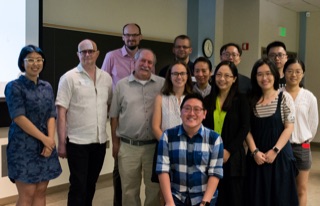
Heterogeneity in student backgrounds is a major hurdle to effective, broad, and inclusive education in areas such as data science. For the most part, traditional university classes are built on the idea that a uniform, linear training program is appropriate and efficient. An alternative perspective is that one-size-fits-all data science training serves few students well.
In an effort to bolster data science training at Penn State, a team of faculty and graduate students from the departments of psychology and human development and family studies led a 3-day workshop focused on the R programming language on August 21-23, 2019. The aim was to give students new to programming or new to R a short, intensive, introduction to R and exposure to some advanced data science techniques. More than 75 Penn Stater's, from beginners to experts, participated.
The R Bootcamp began in 2017 as a cooperative effort among psychology department faculty and graduate students. Michael Hallquist, assistant professor of psychology, and Rick Gilmore, professor of psychology, are course directors. This year, the department of human development and family studies joined as a full partner, with Professors Sy-Miin Chow and Nilam Ram serving as lead faculty.
In keeping with open science principles, all course materials have been openly shared online (https://psu-psychology.github.io/r-bootcamp-2019/), and this year, most sessions were recorded with Zoom.
In addition to faculty- and student-led sessions, the R Bootcamp included a unique evaluative component called iPRACTISE. iPRACTISE, which stands for Individualized Pathways and Resources to Adaptive Control Theory-Inspired Scientific Education, is a new personalized data science education app currently under development and testing jointly by Sy-Miin Chow, professor of human development and family studies and SSRI cofunded faculty member; Dennis Pearl, research professor of statistics and director of CAUSE (Consortium for the Advancement of Undergraduate Statistics Education), and members of the QuantDev group, including Nilam Ram, Peter Molenaar, Timothy Brick, and Zita Oravecz.
The goal of the app is to use modern technology to help users specify their own training goals, provide assessments of users’ current strengths as well as weaknesses, and deliver personalized educational contents to help users accelerate their learning through individually optimized pathways. Other collaborators include faculty from statistics, (Matthew Beckman), psychology (Michael Hallquist and Rick Gilmore); agricultural economics, sociology, and education (Guanqing Chi); educational psychology, counseling, and special education (Pui-Wa Lei); communication sciences and disorder (Kathryn Drager); curriculum and instruction (Andrea McCloskey); biobehavioral health (Michael Russell), and other affiliated departments. This work is funded by the NSF Innovations in Graduate Education (IGE) program (NSF-17-585), a Strategic Initiative grant from Penn State, and a pilot grant from the Center for Individual Opportunity.
The R Bootcamp team acknowledges financial support from the departments of psychology and human development and family studies, the Social, Life, & Engineering Sciences Imaging Center (SLEIC), and the Child Study Center’s Open Data and Developmental Science (ODDS) initiative. Both the iPRACTISE and R Bootcamp teams have received valuable technological support from the Teaching and Learning with Technology (TLT) group, particularly the help of Systems Administrator Matt Hansen.